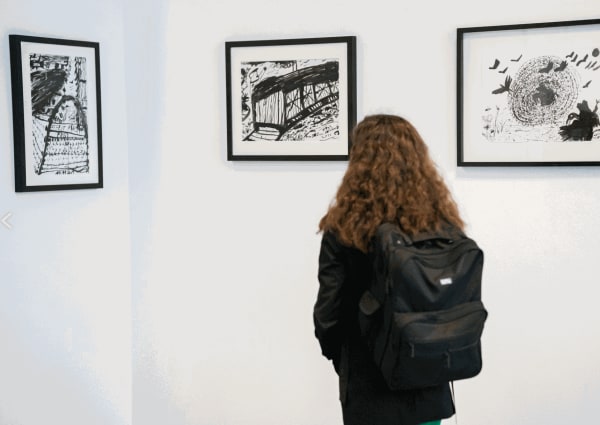On view from August 3 to October 6
European Roma Institute for Arts and Culture
Reinhardtstraße 41–43, 10117 Berlin
Opening hours: Monday – Friday, 9-17
European Roma Institute for Arts and Culture
Reinhardtstraße 41–43, 10117 Berlin
Opening hours: Monday – Friday, 9-17
A white paper is filled with lines of black ink, showing the naked bodies of female prisoners, outlining bare breasts and bony ribcages, with hands covering genitalia. Across the legs in slender capitals: AUSCHWITZ. WE WERE ASHAMED. The drawing depicts prisoners of the concentration camp who were forced to line up and stand in front of SS officers. It represents a scene from Ceija Stojka’s own lived experience as she survived internment in the concentration camps of Auschwitz, Ravensbrück, and Bergen-Belsen.
Under the title Even Death is Afraid of Auschwitz, Ceija Stojka created a series of works dealing with her persecution experiences during the NS reign. This cycle consists mainly of black and white ink drawings and fewer oil paintings, in contrast to the more colorful and expressive paintings highlighting Roma resilience and survival by depicting scenes of nature, landscapes, and Roma wagons, as well as dance and family life moments.
By combining these two distinct cycles of painterly works by Ceija Stojka, the exhibition demonstrates how her works operate as powerful messengers between the past and the future. Stojka has created an impressive body of work after starting to paint in her mid-50s, employing an evocative visual language that challenges conventions of representation and technique. She has developed a practice that accomplishes what Ethel Brooks understands as the reclamation of the camp: “The camp is our history; encampment is both our past and present condition. What will its place be in our future? The camp—the ‘Gypsy’ camp, the slave quarters, the concentration camp, the refugee camp—manifests in multiple iconographies and multiple materialities” (Brooks, 2013), setting the stage for her essay. In this sense, Stojka’s oeuvre employs the temporal and spatial contingencies of her own experience. It generously offers potentialities to imagine a future of self-confidence and pride for Sinti and Roma.
From the 3rd of August to the 6th of October

